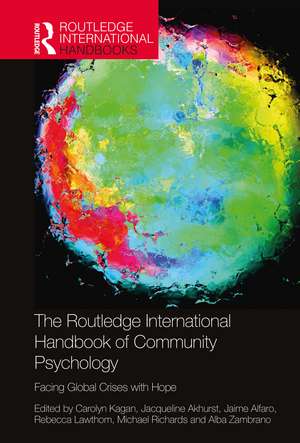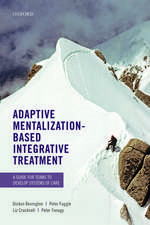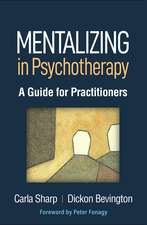The Routledge International Handbook of Community Psychology: Facing Global Crises with Hope: Routledge International Handbooks
Editat de Carolyn Kagan, Jacqueline Akhurst, Jaime Alfaro, Rebecca Lawthom, Michael Richards, Alba Zambranoen Limba Engleză Hardback – 18 mar 2022
| Toate formatele și edițiile | Preț | Express |
|---|---|---|
| Paperback (1) | 425.68 lei 6-8 săpt. | |
| Taylor & Francis – 25 sep 2023 | 425.68 lei 6-8 săpt. | |
| Hardback (1) | 1558.75 lei 6-8 săpt. | |
| Taylor & Francis – 18 mar 2022 | 1558.75 lei 6-8 săpt. |
Din seria Routledge International Handbooks
-
 Preț: 371.78 lei
Preț: 371.78 lei -
 Preț: 375.50 lei
Preț: 375.50 lei -
 Preț: 362.20 lei
Preț: 362.20 lei -
 Preț: 352.09 lei
Preț: 352.09 lei - 9%
 Preț: 1487.73 lei
Preț: 1487.73 lei - 5%
 Preț: 317.32 lei
Preț: 317.32 lei -
 Preț: 372.05 lei
Preț: 372.05 lei -
 Preț: 361.20 lei
Preț: 361.20 lei -
 Preț: 390.14 lei
Preț: 390.14 lei -
 Preț: 311.91 lei
Preț: 311.91 lei - 9%
 Preț: 1488.70 lei
Preț: 1488.70 lei -
 Preț: 390.23 lei
Preț: 390.23 lei -
 Preț: 347.75 lei
Preț: 347.75 lei -
 Preț: 347.75 lei
Preț: 347.75 lei - 9%
 Preț: 1490.13 lei
Preț: 1490.13 lei -
 Preț: 356.23 lei
Preț: 356.23 lei -
 Preț: 348.29 lei
Preț: 348.29 lei - 5%
 Preț: 328.13 lei
Preț: 328.13 lei -
 Preț: 394.25 lei
Preț: 394.25 lei - 8%
 Preț: 392.90 lei
Preț: 392.90 lei - 8%
 Preț: 422.42 lei
Preț: 422.42 lei -
 Preț: 357.23 lei
Preț: 357.23 lei - 8%
 Preț: 421.97 lei
Preț: 421.97 lei - 5%
 Preț: 452.17 lei
Preț: 452.17 lei - 9%
 Preț: 1665.72 lei
Preț: 1665.72 lei - 9%
 Preț: 1651.64 lei
Preț: 1651.64 lei -
 Preț: 350.21 lei
Preț: 350.21 lei -
 Preț: 381.91 lei
Preț: 381.91 lei -
 Preț: 345.64 lei
Preț: 345.64 lei -
 Preț: 347.75 lei
Preț: 347.75 lei - 20%
 Preț: 1401.04 lei
Preț: 1401.04 lei -
 Preț: 342.77 lei
Preț: 342.77 lei -
 Preț: 346.78 lei
Preț: 346.78 lei -
 Preț: 345.17 lei
Preț: 345.17 lei -
 Preț: 353.89 lei
Preț: 353.89 lei -
 Preț: 1058.63 lei
Preț: 1058.63 lei -
 Preț: 348.06 lei
Preț: 348.06 lei - 5%
 Preț: 337.34 lei
Preț: 337.34 lei -
 Preț: 365.90 lei
Preț: 365.90 lei - 9%
 Preț: 1528.89 lei
Preț: 1528.89 lei -
 Preț: 346.12 lei
Preț: 346.12 lei -
 Preț: 392.49 lei
Preț: 392.49 lei - 9%
 Preț: 1454.53 lei
Preț: 1454.53 lei - 9%
 Preț: 1492.85 lei
Preț: 1492.85 lei - 5%
 Preț: 326.87 lei
Preț: 326.87 lei -
 Preț: 361.75 lei
Preț: 361.75 lei - 9%
 Preț: 1349.84 lei
Preț: 1349.84 lei - 19%
 Preț: 422.81 lei
Preț: 422.81 lei - 8%
 Preț: 385.56 lei
Preț: 385.56 lei
Preț: 1558.75 lei
Preț vechi: 1900.91 lei
-18% Nou
298.31€ • 310.28$ • 246.27£
Carte tipărită la comandă
Livrare economică 14-28 aprilie
Specificații
ISBN-10: 0367344157
Pagini: 410
Ilustrații: 6 Tables, black and white; 3 Line drawings, black and white; 21 Halftones, black and white; 24 Illustrations, black and white
Dimensiuni: 174 x 246 x 24 mm
Greutate: 0.85 kg
Ediția:1
Editura: Taylor & Francis
Colecția Routledge
Seria Routledge International Handbooks
Locul publicării:Oxford, United Kingdom
Public țintă
Postgraduate, Professional, and UndergraduateRecenzii
Irma Serrano García, University of Puerto Rico Rio Piedras, Puerto Rico
Notă biografică
Jacqui Akhurst is a Professor Emerita of Rhodes University, South Africa. Her community-based research utilizes Action Research or Activity Theory. Her recent focus has been on community-based service learning in higher education.
Jaime Alfaro is Professor and researcher at the Center of Studies of Well-Being and Social Coexistence, Universidad del Desarrollo, Chile. He has a PhD in social science, University of Girona, Spain.
Rebecca Lawthom is Professor of Community Psychology and Head of the School of Education at the University of Sheffield, UK. She works with others in participatory and collaborative ways to achieve valued change. Her research interests cohere around marginalisation and she writes within the fields of disability, ageing and methods.
Michael Richards is a critical community psychologist who is deputy programme leader of a child and adolescent mental health programme and deputy director of the Arts and Wellbeing Research Centre at Edge Hill University, UK.
Alba Zambrano is an academic of the Department of Psychology Universidad de La Frontera, Chile, in the field of Community Psychology. Research interests include community strengthening processes, prevention of psychosocial problems based on evidence and socio-community inclusion. She is director of the Life Skills Program UFRO JUNAEB agreement.
Cuprins
Descriere
This handbook offers a unique critical and cross-disciplinary approach to the study of Community Psychology, showing how it can address the systemic challenges arising from multiple crises facing people across the world.
Addressing some of the most pressing issues of our times, the text shows how community psychology can contribute to principled social change, giving voice, enabling civic participation, and supporting the realignment of social and economic power within planetary boundaries. Featuring a collaboration of contributions from world-leading academics, early career researchers and community leaders, each chapter gives theory and context with practical examples of working with those living in precarious situations, on matters that concern them most, and highlights positive ways to contribute to progressive change. The editors examine economic, ecological, demographic, gender, violence, energy, social and cultural, and political crises in relation to psychological theories, as well as public policy and lived experiences, presenting an approach situated at the intersection of public policy and lived experiences. Viewed through four different perspectives or lenses: a critical lens; a praxis lens; an ecological lens; and a reflective lens, this compendium of critical explorations into Community Psychology shows how it can contribute to a fairer, more just, resilient, and sustainable world.
Also examining the lessons learnt from the COVID-19 pandemic about the pervading nature of social inequality, but also the potential of solidarity movements ranging from local to international levels, this is ideal reading for undergraduate and postgraduate students and scholars in Community Psychology and related areas, including social psychology, clinical psychology, and applied psychology.







